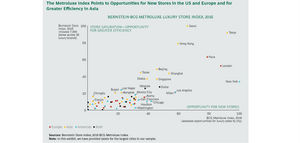PARIS, FRANCE--(Marketwired - Jan 24, 2017) - Luxury hubs such as New York, London, and Paris are very likely to sustain their density of luxury stores. But brands urgently need to examine the efficiency of their existing store networks -- especially across Asia, and particularly in light of the effectiveness of e-commerce.
Those are among the key findings from new research conducted jointly by The Boston Consulting Group (BCG), one of the world's leading management consulting firms, and Bernstein, the research arm of AllianceBernstein. The research draws from BCG's proprietary Metroluxe Index, which assesses opportunities for luxury sales by city, and the Bernstein Proprietary Luxury Store Database, which maps the global luxury retail environment by store and indexes approximately 7,000 stores across 36 luxury brands.
"The global luxury market is changing rapidly, and brands need to adapt accordingly," said Olivier Abtan, a partner and managing director in BCG's Paris office and the global leader of the firm's luxury, fashion, and beauty topic area. "China, though it still offers growth, is no longer the El Dorado it once was. Also, the overall slowdown in the market means that savvy brands now prefer variable cost structures to expensive fixed-cost real estate. And e-commerce is becoming a force to be reckoned with in luxury markets."
The BCG and Bernstein research notes that physical stores continue to play very important roles in brand building for luxury firms. After the abundant openings over the past decade, however, brands today have fewer opportunities for store expansion. The focus now is on initiatives such as moving to better locations, renegotiating rents, and revising store footprints in order to maximize revenue and improve sales density.
The research uncovered three fundamentals that affect the global luxury sector today:
- Many large Asian cities now have too many stores. Top-tier cities such as Tokyo, Seoul, Hong Kong, Shanghai, Beijing, Singapore, and Taipei appear saturated with luxury stores; brands with big footprints in those cities are unlikely to see a significant uplift in demand to support their fixed-cost investments in real estate.
Yet at the same time, the world's six big luxury centers -- New York, Tokyo, London, Paris, Seoul, and Hong Kong -- will continue to dominate the sector's physical channel. BCG and Bernstein expect those cities to continue to support multiple stores per brand, with a mix of flagship stores and select stores catering to large populations of local shoppers and to steady flows of tourists. Noted Bernstein: "Although a consumer's first interaction with a European luxury brand may happen on a trip to Paris, the relationship with that brand will occur globally and throughout the remainder of the consumer's lifetime."
- There is still room for store expansion -- especially in many US cities. In well-served luxury hubs, brands still have room to open additional stores -- and crucially, to push for higher activity per store, on top of e-commerce development. Overall, the US remains a solid market for luxury brands, and many second-tier cities in the US are still underpenetrated. Even though they have less tourist traffic than a hub like Paris or LA, they have strong, steady sales from their local populations.
"Brands must continue to invest in the tools and techniques that help them get better and better at segmenting markets and uncovering pockets of demand," said Abtan. "Analytics software can be invaluable, but it still needs the talent to make it effective and the processes to properly gauge potential markets."
- Digital technology is shaking up the luxury sector -- in many cases, faster than expected. The effectiveness of e-commerce is encouraging leading brands to fast-track omnichannel initiatives and determine which mixes of channels are best suited to which markets. In particular, the growth in and potential of online sales mean less need for marginal stores. And despite the remaining solid opportunity for new stores in select US cities, the nation's strong e-commerce environment will likely result in fewer stores per city, on average, than in other parts of the world.
"Brands must be aware of the digital wave's impact on store productivity everywhere," cautioned Abtan. "They have to anticipate footprint reductions in select areas -- especially in Asia -- and work on getting more sales per square foot in existing stores rather than reflexively opening new ones."
Overall, the BCG and Bernstein study confirms that leading luxury brands are shifting their focus away from the expansion of store networks and toward the efficiency of those networks. Streamlining and optimizing will be the watchwords for luxury brands in the years ahead.
For media requests, please contact Eric Gregoire at +1 617 850 3783 or gregoire.eric@bcg.com.
For requests not related to media, please contact Kelli Gould at +1 312 871-4578 or gould.kelli@bcg.com.
About The Boston Consulting Group
The Boston Consulting Group (BCG) is a global management consulting firm and the world's leading advisor on business strategy. We partner with clients from the private, public, and not-for-profit sectors in all regions to identify their highest-value opportunities, address their most critical challenges, and transform their enterprises. Our customized approach combines deep insight into the dynamics of companies and markets with close collaboration at all levels of the client organization. This ensures that our clients achieve sustainable competitive advantage, build more capable organizations, and secure lasting results. Founded in 1963, BCG is a private company with 85 offices in 48 countries. For more information, please visit bcg.com.
